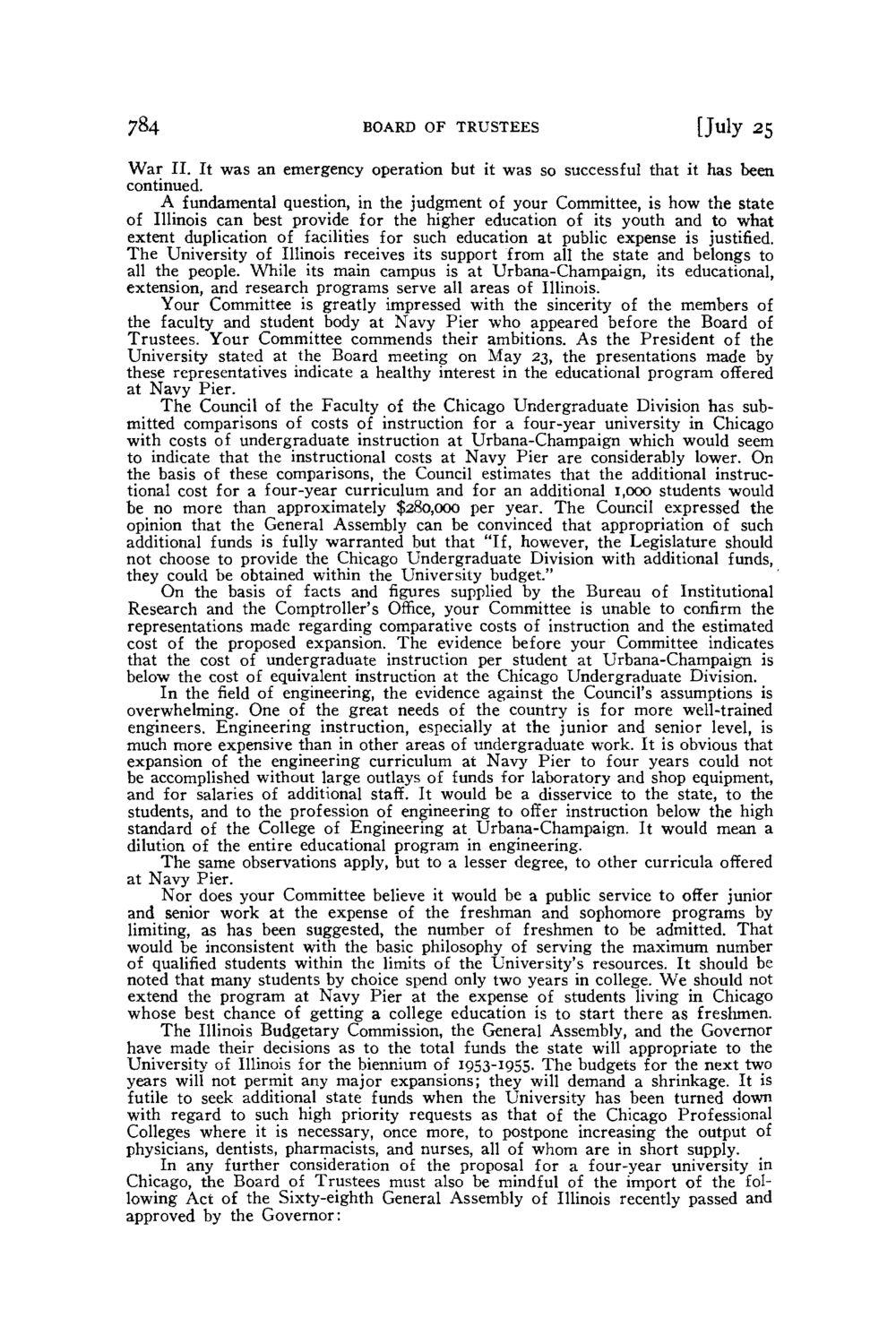| |
| |
Caption: Board of Trustees Minutes - 1954
This is a reduced-resolution page image for fast online browsing.

EXTRACTED TEXT FROM PAGE:
784 BOARD OF TRUSTEES [July 25 W a r I I . It was an emergency operation but it was so successful that it has been continued. A fundamental question, in the judgment of your Committee, is how the state of Illinois can best provide for the higher education of its youth and to what extent duplication of facilities for such education at public expense is justified. T h e University of Illinois receives its support from all the state and belongs to all the people. While its main campus is at Urbana-Champaign, its educational, extension, and research programs serve all areas of Illinois. Your Committee is greatly impressed with the sincerity of the members of the faculty and student body at Navy Pier who appeared before the Board of Trustees. Your Committee commends their ambitions. As the President of the University stated at the Board meeting on May 23, the presentations made by these representatives indicate a healthy interest in the educational program offered at Navy Pier. T h e Council of the Faculty of the Chicago Undergraduate Division has submitted comparisons of costs of instruction for a four-year university in Chicago with costs of undergraduate instruction at Urbana-Champaign which would seem to indicate that the instructional costs at Navy Pier are considerably lower. On the basis of these comparisons, the Council estimates that the additional instructional cost for a four-year curriculum and for an additional 1,000 students would be no more than approximately $280,000 per year. The Council expressed the opinion that the General Assembly can be convinced that appropriation of such additional funds is fully warranted but that "If, however, the Legislature should not choose to provide the Chicago Undergraduate Division with additional funds, they could be obtained within the University budget." On the basis of facts and figures supplied by the Bureau of Institutional Research and the Comptroller's Office, your Committee is unable to confirm the representations made regarding comparative costs of instruction and the estimated cost of the proposed expansion. The evidence before your Committee indicates that the cost of undergraduate instruction per student at Urbana-Champaign is below the cost of equivalent instruction at the Chicago Undergraduate Division. In the field of engineering, the evidence against the Council's assumptions is overwhelming. One of the great needs of the country is for more well-trained engineers. Engineering instruction, especially at the junior and senior level, is much more expensive than in other areas of undergraduate work. It is obvious that expansion of the engineering curriculum at Navy Pier to four years could not be accomplished without large outlays of funds for laboratory and shop equipment, and for salaries of additional staff. It would be a disservice to the state, to the students, and to the profession of engineering to offer instruction below the high standard of the College of Engineering at Urbana-Champaign. It would mean a dilution of the entire educational program in engineering. The same observations apply, but to a lesser degree, to other curricula offered at Navy Pier. Nor does your Committee believe it would be a public service to offer junior and senior work at the expense of the freshman and sophomore programs by limiting, as has been suggested, the number of freshmen to be admitted. That would be inconsistent with the basic philosophy of serving the maximum number of qualified students within the limits of the University's resources. It should be noted that many students by choice spend only two years in college. W e should not extend the program at Navy Pier at the expense of students living in Chicago whose best chance of getting a college education is to start there as freshmen. The Illinois Budgetary Commission, the General Assembly, and the Governor have made their decisions as to the total funds the state will appropriate to the University of Illinois for the biennium of 1953-1955. The budgets for the next two years will not permit any major expansions; they will demand a shrinkage. It is futile to seek additional state funds when the University has been turned down with regard to such high priority requests as that of the Chicago Professional Colleges where it is necessary, once more, to postpone increasing the output of physicians, dentists, pharmacists, and nurses, all of whom are in short supply. In any further consideration of the proposal for a four-year university in Chicago, the Board of Trustees must also be mindful of the import of the following Act of the Sixty-eighth General Assembly of Illinois recently passed and approved by the Governor:
| |